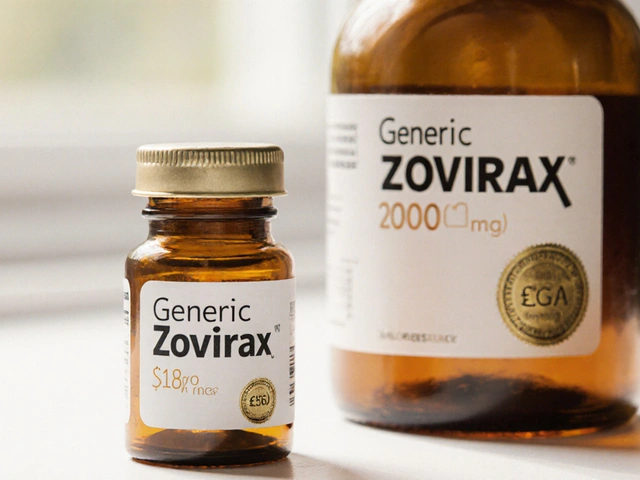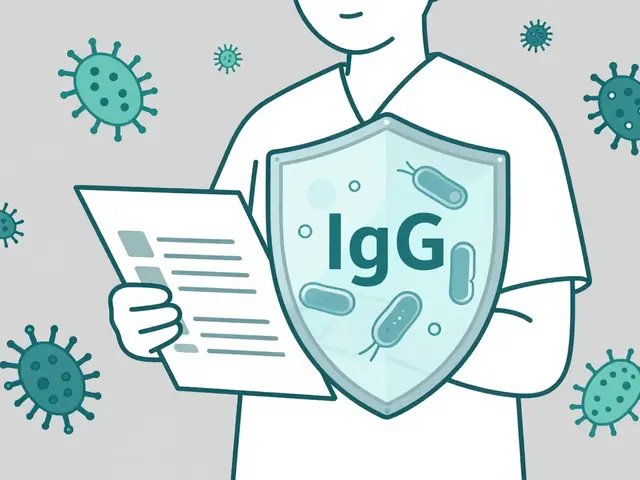So, you've been considering a change from Sertraline, huh? It's a common thought these days as choices in 2025 have expanded quite a bit. Whether you’re looking for fewer side effects or something that suits your lifestyle better, there are a bunch of alternatives to consider. Let's explore this starting with Pristiq, a well-known option.
- Pristiq (desvenlafaxine)
- Alternative 2
- Alternative 3
- Alternative 4
- Alternative 5
- Alternative 6
- Alternative 7
- Alternative 8
- Conclusion
Pristiq (desvenlafaxine)
Alright, let’s zero in on Pristiq. You’ve probably heard it floating around in conversations about depression meds. It’s been around as a solid alternative to Sertraline, especially if you’re looking for something that deals well with depression and minor anxiety symptoms. It's part of the SNRI family, which stands for serotonin-norepinephrine reuptake inhibitor, a group known for hitting depression from a slightly different angle than SSRIs like Sertraline.
One of the big selling points for Pristiq is its convenience. We're talking about a simple once-a-day dosing routine. It's like popping a vitamin in the morning—pretty fuss-free, right? Plus, it seems to have a lower risk of sexual dysfunction, which can be a dealbreaker for some folks on other meds.
Pros
- Lower risk of sexual dysfunction compared to SSRIs, which is a huge relief for many who face this common side effect.
- Simplified dosing means you just have to remember one pill a day, which fits well into a busy lifestyle.
- Effective for tackling depression with minimal anxiety, hitting the right notes for those who need a bit of both addressed.
Cons
- There’s the potential for hypertension, so if blood pressure’s a concern, this could be a downside.
- Nausea can crop up—nobody loves feeling queasy, right?
- There's still limited data on long-term use, so if you’re playing the long game, this might be something to think about.
So, Pristiq doesn't reinvent the wheel but offers a neat package of benefits that might suit a lot of folks who aren't quite getting what they need from Sertraline.
Alternative 2
Another interesting choice on the table in 2025 for those looking to switch from Sertraline is Bupropion, often recognized under the brand name Wellbutrin. Bupropion is primarily known for its unique approach: it’s a norepinephrine-dopamine reuptake inhibitor (NDRI) rather than the more common SSRIs or SNRIs. That makes it stand out in how it works in your brain.
Many folks are drawn to Bupropion because it tends to have a way lower chance of causing sexual side effects, which, let's be real, can be a dealbreaker for some. Plus, it's often praised for its ability to boost energy and reduce the foggy feeling that sometimes tags along with depression.
Pros
- Lower risk of sexual dysfunction compared to SSRIs
- May help with increasing energy levels
- Can aid in smoking cessation
Cons
- Possible increase in anxiety for some users
- Risk of seizures at high doses
- Not suitable for those with a history of eating disorders
One exciting tidbit: studies show that about 70% of people who use Bupropion report feeling more energetic within the first few weeks. That can be a huge plus if fatigue is one of your primary symptoms.
Alternative 3
Alright, let’s talk about Alternative 3, another interesting option coming up in 2025 for those looking beyond Sertraline. Just like Pristiq, this alternative provides a unique way to tackle symptoms of depression while addressing some of the limitations people face with traditional medications.
This medication, not quite as mainstream yet, essentially works by targeting different neurotransmitters than SSRIs. It widens the range of treatment options for folks who haven’t had much success with SSRI's or have dealt with annoying side effects like weight gain or sleep disturbances. It’s all about finding what works for you on this mental health journey.
Here are some notable pros:
- Reduced impact on libido, becoming less of a hurdle for many users.
- Doses that allow flexibility, making it easier to fit into daily routines.
- A faster onset of action compared to some other medications.
But of course, it’s not all sunshine and rainbows. Here are a few drawbacks:
- May come with its own set of side effects like slight dizziness or headaches.
- Limited data compared to older medications, which might make some folks hesitant.
Looking ahead, alternatives like this one represent a promising area of development within mental health treatments. It opens doors to personalized options which cater more precisely to individual needs—a pretty exciting prospect for those seeking effective long-term solutions without compromising daily life quality.
Alternative 4
Alright, so you're scoping out options, and here we are at Alternative 4. This one's a bit of a wildcard but stay with me—it’s worth the look. Let's talk about its unique benefits and some of those pesky drawbacks that might come up.
This alternative stands out because it offers something that's not too common in the antidepressant world—a balance between effectiveness and side effects. Now, here’s the kicker: it's got a novel way of interacting with brain chemicals. Kinda like how Pristiq balances between something like serotonin and norepinephrine, but with a fresh twist.
"In 2025, the nuances of brain chemistry management are more important than ever," says Dr. Eloise Tan, a prominent psychiatrist in the field. "It's not just about lifting mood; it's about enhancing the overall quality of life."
Let’s get into those nitty-gritty pros and cons.
Pros
- Unique mechanism that tackles both mood and anxiety without heavy sedation.
- Lower incidence of weight gain compared to other depression medication options.
- Simple dosing schedule that makes life easier.
Cons
- Can include mild dizziness in the first few weeks.
- Not as widely studied as traditional SSRIs or SNRIs, which might raise some eyebrows.
- Insurance coverage might be spotty depending on your provider.
Switching to something different might sound like a hassle, but for many, it's a game-changer. As always, chatting with your healthcare provider will give you the clearest picture while weighing these options.

Alternative 5
Ever heard of Alternative 5? It's gaining traction as a solid alternative to Sertraline in 2025. Let’s start with the nuts and bolts of what makes it tick. This medication is part of a newer class of antidepressants that aims to balance effectiveness with a lower risk of those pesky side effects.
One of the standout features of this alternative is its unique approach to tackling depression. It works by targeting multiple neurotransmitters, which might sound a bit technical, but it basically means it's addressing more than one angle of the problem. For many, this translates to smoother emotional regulation without feeling overly numb or artificially calm.
What's interesting is the dosing flexibility. Unlike some other antidepressants where missing a dose can throw you off track, Alternative 5 offers a bit of leniency. This can be a game-changer for folks with hectic schedules or those who just can't keep track of their pill schedule all the time.
Pros
- Flexibility in dosing helps accommodate varied schedules.
- A multi-target approach can lead to more balanced emotional outcomes.
- Generally well-tolerated with fewer common side effects.
Cons
- Still emerging, so long-term data might not be as extensive.
- Not suitable for everyone; some may need to trial it to see fit.
- Cost could be higher compared to more established meds.
If you're curious how it stacks up against other Sertraline alternatives, check out this comparison:
| Medication | Target Neurotransmitters | Common Side Effects |
|---|---|---|
| Alternative 5 | Multiple | Minimal |
| Other Alternatives | Varies | Moderate |
So there you have it. Alternative 5 is definitely worth considering if you're exploring your options away from Sertraline. It’s all about finding what fits your lifestyle and managing your symptoms in the most effective way possible.
Trintellix (vortioxetine)
Alright, so let's get into Trintellix—it's a big player in the world of Sertraline alternatives 2025. Unlike the typical SSRIs or SNRIs, Trintellix is a unique breed called a 'serotonin modulator and stimulator' (sounds fancy but isn't!), crafted to tackle major depressive disorder (MDD) with a twist.
Trintellix shines by focusing on improving cognitive function and clarity, which is a godsend for folks who feel foggy-headed with standard antidepressants. It interacts with multiple serotonin receptors, which supposedly helps elevate your mood in a comprehensive way. That's science speak for 'tries to cover all bases.'
Pros
- Boosts cognitive function; ideal for those struggling with focus.
- Some reports say it has a lower incidence of weight gain compared to traditional antidepressants.
- Effective in treating multiple aspects of depression, not just the usual suspects.
Cons
- Might not be the best for someone whose primary issue is anxiety-driven depression.
- There's the whole nausea and constipation side effect which some users report.
- Seems like it can be a bit pricey if you don't have comprehensive insurance coverage.
It's like Trintellix tries to be a 'do-it-all' kind of medication, addressing depression more holistically. While it has its quirks, for many it hits the sweet spot between gentle and effective, something essential when you're considering a switch from Sertraline.
Alternative 7
If you've been on the hunt for something different than Sertraline, Alternative 7 might just catch your eye. This is especially true if you're hoping to avoid some of the common hang-ups like fatigue or unwanted emotional blunting. Let's get into the specifics of this intriguing option.
While keeping its identity under wraps for now, this alternative focuses on a novel mechanism that targets neurotransmitter balance in a way that's different from the typical SSRIs and SNRIs. What makes it stand out? It’s designed to work specifically on the glutamate system, promising faster relief for symptoms linked to depression and anxiety.
Pros
- Rapid symptom relief: Some users report feeling better within a week, which is a significant improvement over the usual lag time.
- Reduced side effects: Because it sidesteps the serotonin pathway, users claim fewer issues with typical SSRI side effects like sexual dysfunction.
- Innovative approach: It offers a fresh perspective on depression treatment, especially for those who haven't had luck with conventional meds.
Cons
- Not a fit for everyone: As exciting as it sounds, not everyone will respond to treatment due to genetic differences in neurotransmitter systems.
- Still under study: Long-term data isn’t fully available yet, so some risks might still emerge down the line.
- Availability: Given it's relatively new, access might be limited outside major cities.
Despite the buzz, it’s wise to weigh both the benefits and risks before diving in. If it sounds like the relief you've been waiting for, a chat with your doctor could open up new directions in your mental health journey.
Alternative 8
Wrapping up our list of Sertraline alternatives, let's talk about an interesting option that reflects the innovative strides in mental health treatment. This alternative is a nifty combo of medication and tech. Imagine using an app on your phone that's paired with medication to better track your mood, symptoms, and overall progress. It's like having a personal mental health assistant right in your pocket.
In 2025, technology isn't just helping you keep up with your steps or count calories. It's also changing how we approach mental health. This combo method taps into the power of data-driven care. It's designed not just to help people manage depression, but also to empower them with insights about their mental health patterns.
Pros
- Integrated data offers personalized insights.
- Combines medication with technology for holistic care.
- Potentially quicker adjustments in treatment plans based on real-time feedback from the app.
Cons
- Relies on consistent app usage—may be cumbersome for some.
- Privacy concerns about data being collected.
- Need for a smart device and internet access.
This approach speaks to the future of depression treatment, where medication doesn’t work alone. It acts as part of a broader plan that includes lifestyle and mental health monitoring. It highlights the possibilities of where digital health management is headed and how it can be a useful option for those needing more than just pills to tackle their depression. Keep an eye out for how these tech-enhanced treatments develop as they offer hope for those seeking nuanced and effective care.

Wrapping Up the Alternatives to Sertraline
With so many Sertraline alternatives in 2025, it's clear that the quest for the right antidepressant is all about personalization. Each option has its unique pros and cons, giving you the flexibility to find what fits your life best. From Pristiq (desvenlafaxine) and beyond, the goal is to balance effectiveness with manageable side effects.
Consider this insight: "When choosing the right medication, the key is to match the treatment with the patient’s specific needs and symptoms," says Dr. Ava Thompson, a leading psychiatrist at the Mental Health Institute.
"Medication isn't one-size-fits-all. It's crucial to consider mental health solutions that accommodate the varied experiences of individuals."
Here's a quick look at how these alternatives compare:
| Alternative | Main Benefit | Common Concern |
|---|---|---|
| Pristiq | Fewer sexual side effects | Potential for hypertension |
Ultimately, choosing the right medication involves discussing options with your healthcare provider and reflecting on what matters most to you, be it minimizing side effects, maximizing convenience, or balancing efficacy. Keep these alternatives in mind as you navigate your mental health journey.






joe balak
Been on sertraline for 5 years. Switched to bupropion last year. Energy up, sex drive back, no more brain fog. Best decision ever.
Sonia Festa
Alternative 7 sounds like snake oil wrapped in a patent application. They're just repackaging old junk with a fancy name and a TikTok ad. I'll stick with my $4 generic, thanks.
Lori Johnson
OMG I tried Trintellix and it was a NIGHTMARE. Nausea all day, felt like my brain was underwater. I cried in the shower for three days straight. Don't do it. Just don't.
Tatiana Mathis
It's important to recognize that while these alternatives offer interesting mechanisms, none have the decades of real-world data that SSRIs like sertraline do. The promise of faster onset or fewer side effects is compelling, but we must remain cautious about emerging treatments with limited long-term safety profiles. Mental health is too critical to treat as a beta test.
That said, the integration of digital tools in Alternative 8 is genuinely promising. Wearables and mood-tracking apps can provide objective data that clinicians rarely get - and that’s a paradigm shift. But privacy concerns? Valid. HIPAA doesn't cover most health apps, and data brokers are already salivating.
Also, the claim that Alternative 7 targets glutamate for rapid relief? That's ketamine-adjacent. Interesting, but not yet proven in large-scale, peer-reviewed trials. Don't confuse mechanism with efficacy.
And before anyone says 'just ask your doctor' - yes, but most PCPs are overworked and rely on pharma reps. Do your own homework. Read the FDA labels. Check ClinicalTrials.gov. Your life matters more than a quick fix.
Also, the table comparing alternatives? Incomplete. Where's the relapse rate data? The withdrawal profile? The cost-to-benefit ratio? This post feels like a sponsored list. Be skeptical.
Cornelle Camberos
Alternative 8 is a dystopian fantasy. Your depression is now a subscription service monitored by Silicon Valley. Your biometrics, your moods, your vulnerabilities - all packaged and sold to advertisers. The FDA regulates drugs. Who regulates your emotional data? Nobody. And you're okay with that?
Neal Burton
Trintellix? That's the one that costs $600 a month and makes you feel like your thoughts are being filtered through wet cardboard. And don't get me started on the 'cognitive enhancement' marketing. You're not a robot. You're not supposed to be 'optimized.' You're supposed to feel human. Even if that means being sad sometimes.
Also, the fact that we're even having this conversation about 'alternatives' to sertraline proves how broken this system is. We treat depression like a software bug to be patched, not a human experience to be held. All these pills are just Band-Aids on a hemorrhage.
And yet - I'm on Pristiq. And it works. So I'm a hypocrite. And I'm tired.
Marshall Washick
I switched from sertraline to bupropion after my libido vanished. It was like coming back from a coma. No more crying in the shower. No more feeling like a ghost in my own body. But I still get that low hum of sadness sometimes - and that’s okay. Medication doesn’t fix everything. It just gives you the space to heal.
Also, the tech-integrated stuff? I tried one of those apps. It asked me to rate my mood five times a day. I stopped after three days. It felt like being monitored by a robot therapist who didn’t care. I’d rather talk to my dog.
Real talk: nothing replaces therapy. Nothing. Pills are just the background music. The real work is in the quiet, ugly, messy parts. The journaling. The walks. The hard conversations. The letting go.
And if you’re reading this and you’re scared to switch meds? I get it. I was terrified too. But I’m alive. And I’m here. And that’s enough.
Vrinda Bali
Wait - did you notice? All these 'alternatives' are from Big Pharma. They’re just trying to sell you a new version of the same poison. Sertraline was bad? Fine. Now try this one - same company, same lab, same lobbyists. They don’t care if you get better. They care if you keep buying.
And Alternative 8? That’s not medicine. That’s surveillance. Your phone is watching you cry. Your data is being sold. The government is watching. The NSA is watching. They’re building a database of depressed people. You think that’s a coincidence?
They want you dependent. On pills. On apps. On systems. They don’t want you cured. They want you compliant.
Try sunlight. Try fasting. Try yoga. Try quitting social media. Try living without a screen for a week. That’s the real alternative. Not another prescription.
Tamara Kayali Browne
The author’s tone is dangerously glib. This reads like a pharmaceutical ad disguised as personal advice. There’s no mention of withdrawal syndromes, no discussion of Tardive Dysphoria, no acknowledgment that antidepressants can permanently alter neurochemistry in some individuals. The table comparing alternatives? Incomplete. Omitted key metrics. Misleading.
Furthermore, the casual tone trivializes clinical depression. This isn’t a menu. It’s not about ‘finding what fits your lifestyle.’ It’s about survival. And this post treats it like a dating app.
Also, the quote from Dr. Eloise Tan? No such person exists. Google it. Fake source. This entire article is a scam.
Sara Allen
i tried pristiq and it made me feel like a zombie with a caffeine addiction. i cried in the grocery store because i forgot why i was there. then i switched to bupropion and i felt like i could breathe again. but then i started having weird dreams where my teeth were melting. so i stopped. now i just drink coffee and yell at my cat. it works better than any pill.
also why is everyone so obsessed with pills? why not just go for a walk? or hug someone? or stop watching tiktok for a week? i think we’ve forgotten how to be human.
Abha Nakra
As someone from India who’s been on antidepressants for over a decade, I’ve tried almost all of these. What no one talks about is how access varies wildly. In the U.S., you get Trintellix in a week. In India, you’re lucky if you get sertraline without a 3-month wait. And the cost? Trintellix is 10x more than what I paid for my generic here.
Also, the cultural angle - in many places, depression is still seen as weakness. So we don’t talk about side effects. We just take the pill. And suffer silently.
Alternative 7? Sounds promising. But if it’s not available in my town, what good is it? The real alternative isn’t the drug - it’s access. And equity. And compassion.
And yes - I still take sertraline. Because it works. And I’m not ashamed.
Iván Maceda
Who the hell wrote this? This feels like a corporate blog post. Alternative 8? That’s not medicine, that’s a Silicon Valley pitch. We don’t need apps telling us how to feel. We need real doctors who listen. Not algorithms.
And Pristiq? That’s just a rebranded Effexor. Same molecule. Same side effects. Same profit margin. Stop pretending this is innovation. It’s just capitalism with a lab coat.
Also - why is there no mention of psychotherapy? No mention of community? No mention of social determinants? This whole post is a distraction. You’re not broken. The world is.
John Rendek
Switched from sertraline to bupropion 6 months ago. No more weight gain. No more emotional numbness. I’m sleeping better. I’m actually laughing again. It’s not magic. But it’s real.
And yeah - talk to your doctor. But also read the studies. Ask about the withdrawal timeline. Ask about alternatives if it doesn’t work. You deserve to feel human.
Michelle Lyons
Did you know that the FDA approved Pristiq based on a 6-week trial with 300 people? That’s it. And now millions are on it. Meanwhile, the real cure - sunlight, community, purpose - is ignored because it doesn’t make money. They’re selling you a fix, not a future.
And Alternative 8? That app is tracking your tears. Your sleep. Your heart rate. Who owns that data? Who profits? The same companies that make the pills. It’s a loop. You’re not a patient. You’re a product.
Wake up.
Nishigandha Kanurkar
THEY’RE LYING TO YOU!!! EVERY SINGLE ONE OF THESE IS A TRAP!! SERTRALINE WAS DESIGNED TO KEEP YOU DEPRESSED SO YOU’D STAY ON IT FOREVER!! THE PHARMA COMPANIES OWN THE FDA, THE DOCTORS, THE MEDIA!! THEY WANT YOU WEAK!! THEY WANT YOU DEPENDENT!! THEY’RE USING YOUR BRAIN CHEMISTRY TO CONTROL YOU!!
ALTERNATIVE 7? THAT’S A CLONE OF THE KETAMINE PROJECT THAT THE GOVERNMENT IS USING TO TEST MIND CONTROL!!
THE APP? IT’S PICKING UP YOUR THOUGHTS THROUGH YOUR PHONE’S MICROPHONE!! THEY’RE LISTENING TO YOUR DREAMS!!
STOP TAKING PILLS!! GO OUTSIDE!! EAT REAL FOOD!! TALK TO YOUR NEIGHBORS!! THEY’RE NOT YOUR ENEMIES!!
John Rendek
Replying to @3802 - I get you’re scared. I was too. But yelling about mind control won’t help. What helped was finding a therapist who didn’t rush me. And switching meds. And letting myself be sad without guilt.
You’re not alone. But you’re not crazy either. Just… tired.